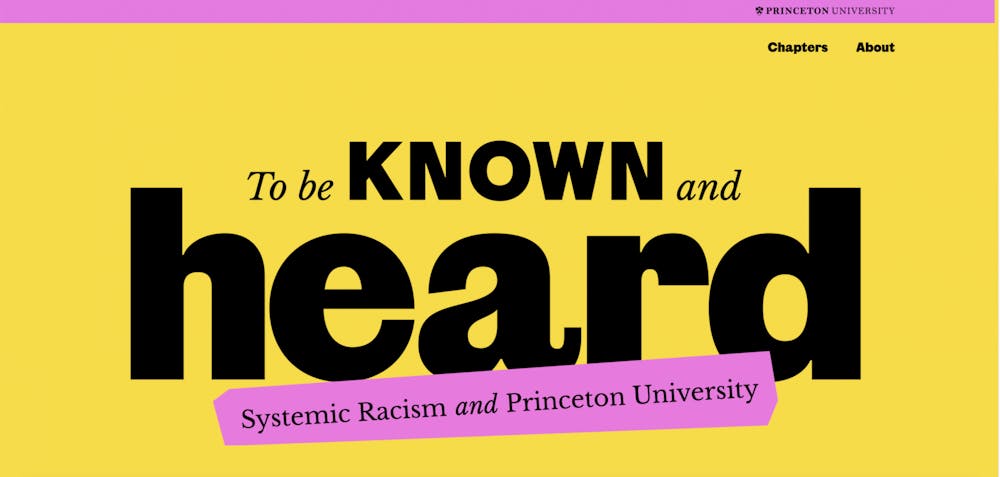Princeton’s orientation programming is packed. First-years are sorted into various small group programs, participate in dozens of events, and attend several trainings designed to help them get their bearings as college students. This year featured a new addition to the traditional programming. First-years watched a recording of a virtual “roundtable” discussion which examined a gallery entitled “To Be Known and Be Heard: Systemic Racism and Princeton University.” In the recording, professors examined documents concerning racist moments in Princeton’s history.
In response, University professors John Londregan and Sergiu Klainerman penned an article in the New York Post criticizing the mandatory event, dubbing it “one-sided.” As small group orientation leaders, we watched the video ourselves. After reading Londregan and Klainerman’s article, we are confused as to whether they watched the same recording.
Indeed, we find their critique both misplaced and dangerous.
Londregan and Klainerman appear concerned that the video is meant to indoctrinate students and represents a threat to our universal right to free speech, a University commitment they deem “fundamental.” Yet, the professors who participated in the recorded discussion seem committed to free-flowing discourse as well.
Classics professor Dan-el Padilla Peralta neatly makes the point that faculty should help students to think critically — “not with a view to habituating them into a practice of assimilation or indoctrinating them in the belief that somehow this is the best damn place of all, but in order to supply them with the tools with which they can tear down this place and make it a better one.”
To us, it seems that Londregan, Klainerman, and Peralta all actually agree: the University should not seek to indoctrinate students. It should instead provide them with the facts and tools they need to seek the truth. Perhaps the larger issue is that Londregan and Klainerman construe truth-seeking differently than the rest of us.
Their primary concern is that the video was “one-sided.” We assume they believe that a video on the University’s ties with racism must also discuss “positive” aspects of the University.
They write that “yes, Princeton President John Witherspoon owned slaves, but he was also the only clergyman to sign the Declaration of Independence, and he helped secure ratification of the Constitution and prevent the establishment of a national church.”

And, “Yes, there were Princeton graduates who fought and died on the side of the Confederates, but there were just as many who fought to preserve the Union.”
But truth-seeking is not about trying to morally justify a slaveholder by highlighting his historical accomplishments. And it certainly isn’t about “bothsidesing” the Civil War.
We should understand free speech as a tool to ensure that a multitude of ideas can exist, even the ones we don’t like. We can write this op-ed, and Londregan and Klainerman can write theirs. However, we don’t need to treat every view as legitimate, or believe there must be two redeemable sides to every story.
The professors write that they do not oppose having a frank discussion about the University’s history, “with its faults, yes, but also its glories.” But, we ask, is a video on systemic racism at the University really the place to highlight unrelated “glories”?

Neither the video, nor the project at large, are by nature opinionated. Instead, they show first-years an important, fact-based account of the University that they don’t see in the rest of the exceedingly positive orientation experience: that Princeton is not perfect, or magical, or removed from the story of American racism. Londregan and Klainerman are upset that a video on racism was “utterly one-sided” — but maybe it has to be.
Londregan and Klainerman’s op-ed would be easy enough to dismiss and ignore. But we can’t help but notice how, over the past year, many have used the buzzword of “indoctrination” to prevent us from having open and honest conversations concerning race.
Capitalizing on manufactured outrage for the sake of a political talking point, multiple states have signed vague legislation banning “critical race theory,” a practice of interrogating race and racism in society, from public school classrooms. This has led to confusion on how educators are able to discuss race in high school classrooms. And though most of the new laws apply to K-12 education, some fear they may also affect universities.
Our University recently faced national media attention for offering a course exploring the historical roots and growth of the Black Lives Matter movement — with a scare-quote-laden Fox News headline noting: “Princeton offering 'Black Lives Matter' course taught by professor with 'commitment' to 'critical race theory.'” Even Sen. Ted Cruz ’92 (R-Texas) expressed alarm, tweeting, “Very sad to see my alma mater’s woke indoctrination.”
Cruz’s outrage and the broader crusade against critical race theory fly in the face of the free speech and academic freedom that the Republican Party often claims to hold dear. They essentially say: “Speak and explore freely … unless discussing racial injustice.”
This contradiction eventually plays out into the same dishonest, “bothsidesing” tactics that Londregan and Klainerman employ in their writing. Critical race theory opponents misrepresent the scholarly framework in one breath. In the next, they demand us to find something “good” to say about slavery — as one Louisiana lawmaker did last spring.
Such dishonesty, fear tactics, and misdirections directly undermine public faith in critical race theorists before the public ever hears their actual ideas. And in this way, the free speech of critical race theorists is directly suppressed.
Here, it is important to note — as “To Be Known and Heard” points out — that free speech is a right that has never been bestowed equally upon everyone. Amid a history of injustice against minority students, many voices and memories have long been pushed out of public discourse. That is why conversations like the Class of 2025 orientation event are important, even if they aren’t all-encompassing.
They force us to remember the history left out of campus brochures and Orange Key guided tours. And it’s up to us to figure out what we need to do with that knowledge.
The title of the “To Be Known and Heard” gallery comes from Michelle Obama ’85. In her autobiography, Obama writes, “There’s a power in allowing yourself to be known and heard, in owning your unique story, in using your authentic voice. And there’s a grace in being willing to know and hear others. This, for me, is how we become.”
The exercise of free, authentic voices can be powerful. But that power only takes root when we are willing to listen and hear the voices at hand. When we refuse to give grace by listening fully to the voices of others, especially historically marginalized voices, we make the same mistake as Londregan and Klainerman. We shout over and misrepresent voices we dislike. We seek false equivalencies rather than truth.
Suppressing facts you don’t agree with — or shoving them into a box with buzzwords — is no way to become.
AG McGee is a senior in the philosophy department from Grand Rivers, Ky. and a Community Action leader. AG works on the ‘Prince’ as a Managing Editor, serves on the editorial board, and can be reached at amcgee@princeton.edu.
Zachary Shevin is a senior in the economics department from Boca Raton, Fla. and a Community Action leader. Zachary works on the ‘Prince’ as a Managing Editor, serves on the editorial board, and can be reached at zshevin@princeton.edu.
This piece reflects the views of Shevin and McGee alone.








